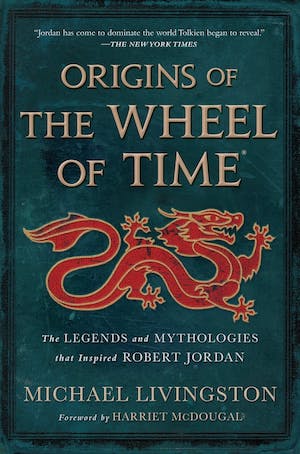Add your vote: What does BU stand for, and why is it not Bugarup University?
Summary
Rincewind has to make a dessert for the opera singer Nellie Butt and whips something together with peaches and brandy, suggesting that they call it a Peach Nellie and avoid their little conundrum altogether. The Watch show up at the restaurant, but the staff volunteer to keep them busy to give Rincewind time to escape—everyone wants him to put on a good showing so that his song will be epic. Scrappy shows up and Rincewind insists that he’ll get away by boat, but Scrappy informs him that no one sails too far from the bays of XXXX in case they fall off the rim. Rincewind winds up coming across a lot of very sequined ladies, and asks one named Letitia for a ride in her cart. He assumes that she and Darleen and Neilette are part of a carnival, and they keep batting men away from the cart. Rincewind realizes that his “Famous Land Stand” is upon them and tries to get away down an alley, while the guards follow. Suddenly, a wild Luggage appears. The wizards wake up on the shore of the continent where loads of thaumic energy makes it a very bad idea to use magic. Their temporal glands result in everyone reverting into childhood or disappearing entirely while they work themselves out, though Ponder manages to get older. They all revert back quickly, but Ponder decides they should fight the deity of the island after experiencing that.
Buy the Book


Origins of the The Wheel of Time
Rincewind tells Luggage off for being dressed in heels and sequins and demands a pair of his underwear. It turns out that the Luggage has been traveling with Letitia, Doreen, and Neilette and that they’ve been calling him “Trunkie.” Neilette was hiding in the Luggage and Rincewind realizes that the group are “female impersonators”—except for Neilette, who is a woman and covering in the group for her brother Noelene. They find the old brewery her family owns but can’t use, a place where all beer goes flat, and the ceiling caves in on them. They hide inside the Luggage and when they get out, Rincewind sees the silhouettes of a group of wizards. The place is filling with smoke, so they exit through a cellar. Once outside, they notice that all the water seems to be dried up. Rincewind learns that there’s a university on XXXX for wizards and asks Neilette to take him there, certain that’s where he’ll need to be for his last stand. The wizards find the Bursar in a cave with a god who is drawing on the walls. The Dean takes up his own twig and starts drawing, trying to show the fellow perspective, but the god isn’t interested because perspective is a lie—the point is to draw things as they are, not as they appear.
Rincewind and Neilette arrive at the XXXX wizard university, and find the back way in. Rincewind arrives in the center of a summoning circle of wizards, who claim to have summoned him in order to find out what happened to the water. Rincewind insists that he can’t make it rain, but that he thought all wizards could manage a rainmaking spell and disparages their university, so they decide to bring him to the top of their tower… which turns out to be taller at the top than it is at the bottom, resulting in a short climb that actually brings you half a mile into the air. He then learns that the Four Ecksian Archchancellor is also called Rincewind (though his first name is Bill). They wonder if they might be related. They get Rincewind drunk to see if that helps him make more sense and decide to bring him back to the brewery. They test the area for magic and find the silhouettes of the wizards again, but insist that’s not magic—it’s ghosts. Rincewind heads down into the cellar again and finds writing all over the walls. Most of it is nonsense, but at one end there’s a drawing of pointy hats in ochre. The door there leads to another cellar, and then another drawing, so Rincewind has the Luggage crash through the wall and they find a large cave. Rincewind asks for paint, and starts painting the impression of a group of wizards, which allows past and present to meet and brings the Unseen University wizards back to their own time.
The walls immediately start closing in, trying not to exist, so Rincewind turns tail and runs. After a period of confusion, Ridcully suggests an exchange program with the XXXX university, and they talk about making it rain, but nothing seems to be working. Rincewind checks on the Librarian and suggests that he could fix his problem by telling the wizards his name, but the Librarian won’t have it. Death pops by to give Rincewind a fright again, and Rincewind swings the bullroarer that the Librarian brought from the past menacingly in his direction. Both he and the Librarian notice that swinging the bullroarer creates the scent you find after it rains. Rincewind spins around and around, swinging the thing, and a giant cloud emerges—it begins to rain. The people head to the university to celebrate the wizards’ triumph, not knowing that Rincewind is responsible. A large bolt of lightning hits the tower while Rincewind and the Librarian are inside, which seems to cure the Librarian’s ailment. Days later the wizards are ready to board a boat back to Ankh-Morpork laden with XXXX imports. All of Rincewind’s new pals ask if he wants to stay (he’s received a pardon from the prime minister), but he turns them all down, and boards the boat with the Luggage to head home.
Commentary
It’s sort of too bad, really, that out of all the parodies in this book, the Priscilla section is the one that bugs me the most.
Generally speaking, parody can only be as good as the material it’s referencing, and even then, it’s a fine line to walk. The more successful bits of this book occur when Rincewind suddenly does or says something straight out of Crocodile Dundee because it’s surprising and funny at once, and a good way of referencing something else that doesn’t result in pulling too much of its story wholesale. The Mad Max bits work similarly.
The problem with the Priscilla section dovetails with my earlier comment about this book being so thin on female characters. The adjustment made here on Pratchett’s part is to make Neilette (whose counterpart in the film would be Bernadette, presumably) a cis woman, which effectively breaks the parody in an unintentionally crappy way—yes, there’s another woman besides Mrs. Whitlow in the book, finally, but that could have been achieved without skewing too far from Priscilla’s actual main cast… two drag queens and a trans woman. And what’s more disappointing is that all the jokes that get made about Neilette’s presence would have been affirming for a trans woman character (particularly the bit about the university not allowing women inside). It’s possible that Pratchett simply didn’t feel qualified to manage the commentary here, but it’s such a shame after everything he’d already done so well with Cheery and Nobby. Or just strike it; he could’ve done a Strictly Ballroom parody instead, and it would have worked just as well. Or Muriel’s Wedding.
On the other side of what works, however, I keep coming back to Ponder saying that being old was like “wearing a lead suit” and that he never wants to go through that again. And then when Ridcully assures him it will, Ponder’s response is literally, well, let’s go fight god then. It’s a thought that I’ve been coming around to a lot lately because that reaction seems to be the common theme for any relatively able-bodied person feeling the first pangs of aging. And it’s sort of bemusing to me on a personal level because, as a person with a truly weird set of disabilities, my body hasn’t behaved in any way I’ve wanted it to since I was about… eight? So while Ponder’s reaction makes plenty of sense, it brings out the first-time.gif reaction in me. Sorry, buddy.
But also, he’s right, let’s go fight (any and every) god about it.
Outside of that, I enjoy that the solutions to Rincewind stories tend to be outside-the-box and also fairly nonsensical in their own special way. Paint a cave! Swing a bullroarer! Get hit by lightning! But it doesn’t change what I said at the very start of this book—as novels, they are just plain weird, and not quite as tightly woven as other Discworld stories. Maybe the problem is that I kind of prefer him with a partner? I did find myself missing Twoflower in this one…
But I do appreciate that this is the very first story where people seemed to like Rincewind and wanted him around. And I’m sort of sad that he didn’t feel as though he could stay.
Asides and little thoughts:
- The “wonder where they got their shoes from” bit is a nod to the fact that it’s often incredibly rough for drag queens (and trans women, for that matter) to find femme shoes in their sizes. There was a shop in my hometown that catered specifically to that community, and I have a distinct memory of going in there with my mom (who was looking for performance accessories as a singer) as a kid and wondering why all the heels were so large. Took a few years for the penny to drop.
- It’s rude to the platypus to suggest it was invented by a committee (it is a weird and beautiful animal!), but I have to admit that this version of the joke makes me laugh anyhow.
Pratchettisms:
Rincewind looked away. There was probably something morally wrong about staring at women’s clothes without women in them.
“Oh, that’s just apprehensions of mortality,” said Ridcully. “Everyone gets that.”
Ponder shook his sleeves to leave his hands free. For a wizard, this was the equivalent to checking the function of a pump-action shotgun.
Unseen University was built of stone—so built out of stone that in fact there were many places where it was hard to tell where wild rock ended and domesticated stone began.
If they had been painted, it had been an historical event, probably coming somewhere between Fire and the Invention of the Wheel.
Bill looked up at the roof, where the shadows danced among the stalactites, unless they were stalagmites.
Contrary to the usual procedures it began to grow lighter, although the proliferation of luminous fungi or iridescent crystals in deep caves where the torchlessly improvident hero need to see is one of the most obvious intrusions of narrative causality into the physical universe. In this case, the rocks were glowing, not from some mysterious inner light but simply as though the sun were shining on them, just after dawn.
As loudly as a thunderstorm under the bed but as softly as two soufflés colliding, past and present ran into each other.
Next week we begin Carpe Jugulum! We’ll read up to:
“Good,” he said. “We are famous for our hospitality.”










